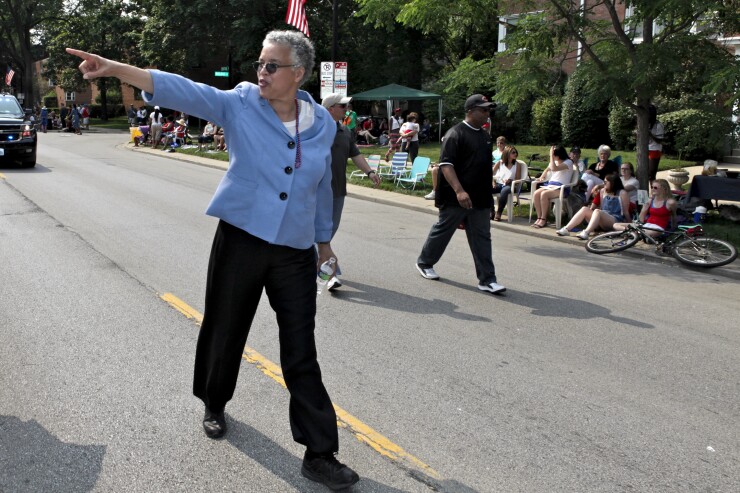Amid warnings about a rising healthcare tab, the Cook County, Illinois, Board of Commissioners signed off on an easy-to-swallow $6.2 billion budget that closed a modest $18.7 million gap and honors a supplemental pension funding plan without any new taxes or fee hikes.
“This budget is building on our continuing dedication to providing essential services while being fiscally responsible all without the need to increase existing taxes,” board President Toni Preckwinkle said. Cook includes Chicago and is the nation’s second-most-populous county. The board voted 15-1 on the budget for the fiscal year that begins Dec. 1.
More than 90% of its annual budget solutions are structural in nature and the $18.7 million gap is down from the nearly $500 million shortfall Preckwinkle faced in her first year eight years ago.

This year's shortfall was closed by measures that included not filling some vacant positions and healthcare savings, and boosted by a $9 million tax-increment financing surplus.
The county’s current fiscal stability stands in contrast to the budget strains of Chicago and the Illinois state government.
The Chicago City Council will vote on a 2020 budget with some tax and fee hikes and Illinois is asking voters next year to approve a shift to a graduated income tax system from the current flat rate in order to raise $3 billion more annually to deal with its structural deficit.
About $2.8 billion of the Cook County budget goes to the health system and $1.3 billion toward public safety. The budget earmarks $283 million for capital projects, $105 million for highway work, and $103 million for capital equipment. About $200 million in borrowing is expected. The county projects a fund balance this year of $368 million, above a $309 million target.
The budget stays on course with supplemental contributions to its pension fund that have not yet been cemented in state law. The county will make an additional $327 million pension contribution above its $200 million statutory amount, bringing to $1.3 billion total supplemental payments over five years. The unfunded actuarial accrued liabilities are $6.8 billion for a funded ratio 60.9%.
The county pushed through a sales tax hike in 2016 to raise funding levels. Legislation has stalled that would factor in the supplemental contributions toward an actuarial level over the current statutory level that falls short of an actuarial amount.
S&P Global Ratings rates the county AA-minus with a negative outlook. Fitch Ratings rates the county A-plus with a stable outlook. Moody’s Investors Service assigns its A2 rating and stable outlook. The county has more than $3 billion of debt outstanding under its general obligation and sales tax-backed credits and its credit line.
Fitch recently affirmed the county’s rating, saying it reflects “broad revenue raising capacity, limited expenditure flexibility and moderate long-term liabilities.
“The rating also reflects the progress the county has made in fundamentally realigning revenues and expenditures, improving its capacity to weather a moderate economic downturn, as well as its plan to improve pension funding in a way that does not present a risk to operations,” Fitch added.
The county’s budget includes a longer-term financial forecast that casts a shadow over the current picture with a $110 million gap in the general fund and health fund projected for next year grows to $307 million in 2024 with $197 million due to rising healthcare costs.

Pressures are mounting on uncompensated health care costs which are projected to rise by $46 million next year to $590 million due in part to unaffordable, high-deductible health insurance plans offered on the insurance marketplace created by the federal government’s Affordable Care Act. The county also suggested that other hospitals were increasingly referring uninsured patients to the county health system. More recently officials have also cited a significant decline in Medicaid managed care enrollment.
The Chicago Civic Federation endorsed the budget as a reasonable plan that “holds the line on increasing taxes or fees while continuing to make investments in communities and services” and honoring the supplemental pension payment plan. It warned of pressing strains ahead.
“This prudent one-year plan should be viewed as a calm-before-the-storm budget,” federation president Laurence Msall said in a statement. “The trend in uncompensated care is alarming.”
Fitch’s report underscored the impact of the healthcare system on the county’s fiscal health. “Indications that weakened health system operations will make a greater claim on general fund resources would be a negative credit consideration,” Fitch said.





